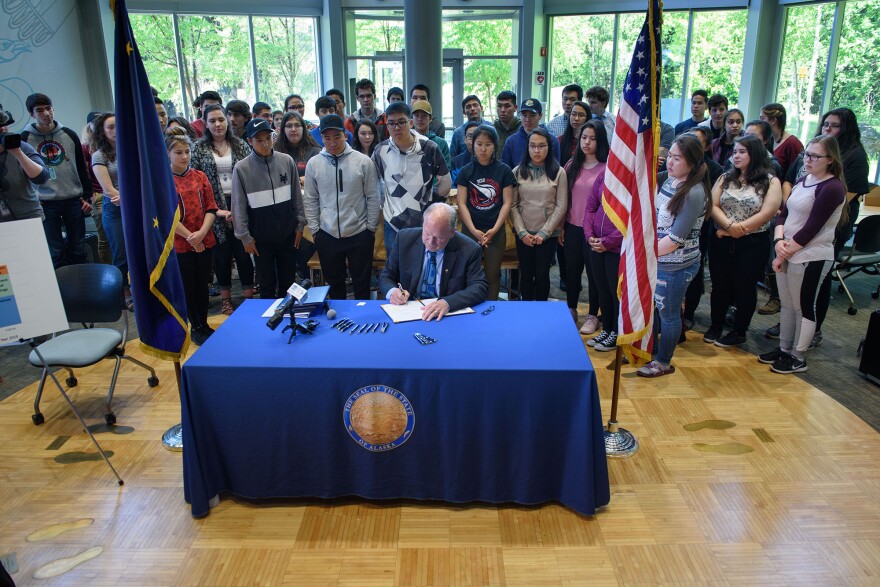Governor Walker signed the state budget on Wednesday. KDLG’s Izzy Ross talked with the governor about how Senate Bill 26 will impact Permanent Fund Dividends, and about efforts to bolster state trooper retention.
Audio Transcript:
Ross: Governor Walker, thank you for joining me today. I’d like to start with Permanent Fund Dividends. The legislature adopted Senate Bill 26 last month. It sets rules for a structured draw from the Permanent Fund to pay for state government for the first time in its history. How do you anticipate it will affect PFDs?
Walker: What 26 does is it ensures there will be a dividend. The legislature went through 14 billion dollars of savings before they made the adjustment they did this year. The concern was without any structured draw from the earnings, if they took the 14 billion out of the savings account, and then took 14 billion dollars out of the earnings, that would reduce the dividend to a matter of hundreds of dollars rather than nearly two thousand. So, it was critical for 26 to create a limitation of how much they can draw out of the earnings so that the Permanent Fund can continue to grow. What we introduced – it was titled the ‘Permanent Fund Protection Act’ to protect the Permanent Fund so the dividends can be paid for generations and generations rather than just a few high years of payouts and then it’s gone.”
Ross: Many residents in Bristol Bay villages and other parts of rural Alaska rely on PFDs to offset the high cost of living in the region. Can you speak to your position on Permanent Fund Dividends?
Walker: “It became evident when we came into office when there was almost a 3.7 billion dollar deficit that some things were going to have to change. We knew for sure we were going to have to draw some of the earnings off of the Permanent Fund earnings to help pay for the cost of government. So we needed to grow the Permanent Fund itself. So we reduced the dividend, left all the money that was reduced in the earnings account itself – we didn’t spend that money – to help grow the dividend and grow the fund itself. It’s gone up to $1,600 this year. About five years ago it was about $800. So this year the legislature established a draw on it for the dividend and to help fund the government. We proposed a floor on the dividend; it wouldn’t go any lower than a certain percentage of the earnings. That didn’t pass, but we hope that will be in place. Someone recently asked me about a cap, and I don’t think there should be a cap. I think it should go as high as it can be paid without jeopardizing the fund itself.”
Ross: Alright. I’m going to turn to public safety. Many Bristol Bay villages don't have their own police departments, and rely on state troopers for law enforcement. How is the state addressing crime in rural Alaska?
Walker: “You know, one of the challenges we have is that we need to make sure we’re competitive with what our troopers are paid. We’ve lost a lot of our troopers to King County and Washington State, because of their benefit package and retirement, etcetera. So we are trying to become competitive. All this is happening in the biggest fiscal crisis in our state’s history, so it’s challenging to do that, but we are working with the trooper’s association to look at ways that we can incentivize the retention of the troopers – we don't want to lose any more than we have already – but we also want to bring in new troopers. So, there’s a lot of discussion about cutting the budget and cutting this and cutting that. There’s a price to pay when you cut too much and when you’re not able to be competitive in the law enforcement area. So we’re trying to change that. We’re working with them as far as some non-monetary things we can do to help the retention of the troopers.”
Ross: Could you tell me any specifics about those non-monetary incentives?
Walker: “Well, we’re still in negotiations on that, so I’m not sure I can really quite say that. I know I came out of a meeting last week when I was briefed on some of the things we’re going to be proposing. We have sat down with them to look at what can be done to improve their situation to help them stay on the job and stay Alaska State Troopers.”
Ross: Governor Walker, thank you for talking with me today.
Walker: Thank you for your time.
Contact the author at isabelle@kdlg.org or 907-842-5281.




